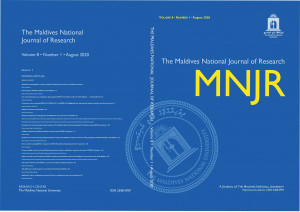COVID-19 perceptions and vaccine acceptance in the Maldives
DOI:
https://doi.org/10.62338/7n3tx785Keywords:
COVID-19 vaccine, acceptance, the Maldives, side-effects, religious viewsAbstract
The aim of the study was to identify the perceptions regarding the COVID-19 epidemic and acceptance of COVID-19 vaccine. A cross-sectional study design was employed to collect the data for the study using an online questionnaire. Among 700 participants, 602 (86%) people agreed that they would get the vaccine if it became available. The reasons people gave for not agreeing to get the vaccines were that the vaccine might have side effects, it might be too expensive, and it might not be safe. Only 1.2% said that they did not want to vaccinate due to religious reasons. Vaccine acceptance was associated with age, employment status, and Influenza vaccination in the past 12 months. Although the perception towards the COVID-19 vaccine was good in general, there were some negative perceptions too. Hence, creating public awareness regarding the vaccines and the importance of vaccination is crucial.
References
ADRC. (2020). COVID-19 Response and counter measures in Sri Lanka. Retrieved from https://www.adrc.asia/publications/disaster_report/pdf/covid19/LKA_eng.pdf
Al-Mohaithef, M., & Padhi, B. K. (2020). Determinants of COVID-19 vaccine acceptance in Saudi Arabia: A web-based national survey. Journal of multidisciplinary healthcare, 13, 1657–1663. https://doi.org/10.2147/JMDH.S276771
Centres for Disease Control and Prevention. (2019). COVID-19. Retrieved from https://www.cdc.gov/coronavirus/2019-ncov/faq.html#:~:text=A%20person%20may%20get%20COVID,main%20way%20the%20virus%20spreads.
Harapan, H., Wagner, A. L., Yufika, A., Winardi, W., Anwar, S., Gan, A. K., . . . Sofyan, H. (2020). Acceptance of a COVID-19 vaccine in Southeast Asia: A cross-sectional study in Indonesia. Front Public Health, 24-28.
Homes, M. G., Armin, N., Fulicate, J. D., Sharma, N., Beltimo, H., & Roger, J. V. (2020). Achieving herd immunity from COVID-19 pandamic. Journal of Medicine, 33-37.
Kreps, S., Prasa, S., Brownstein, J. S., Hswen, Y., Garibald, B. T., Zhang, B., & Krine, D. L. (2020). Factors Associated With US Adults’ Likelihood of Accepting COVID-19 Vaccination. JAMA Netweork, 65-67.
Lazarus, J. V., Adam, S., & Kimball, S. (2020). A global survey of potential acceptance of a COVID-19 vaccine. Nature Medicine, 123-128.
Liu, Y. C., Kuo, R. L., & Shih, S. R. (2020). The first documented coronavirus pandemic in history. Biomedical journal.
Malik, A. A., Fadden, S. A., Elharake, J., & Omer, S. (2020). Determinants of COVID-19 vaccine acceptance in the US. E Clinical Medicine, 8-57.
National Bureau of Statistics. (2017). Statistical Pocketbook of Maldives 2017. Male’: Ministry of Finance & Treasury.COVID-19 perceptions and vaccine acceptance
Pugliese-Garcia, M., Heyerdahl, L. W., Mwamba, C., Nkwemu, S., Chilengi, R., Demolis, R., Guillermet, E., & Sharma, A. (2018). Factors influencing vaccine acceptance and hesitancy in three informal settlements in Lusaka, Zambia. Vaccine, 36(37), 5617–5624.
Schaffer DeRoo, S., Pudalov, N. J., & Fu, L. Y. (2020). Planning for a COVID-19 vaccination program. JAMA, 323(24), 2458–2459. https://doi.org/10.1001/jama.2020.8711
WHO. (2019). World Health Organization. COVID-2019 situation report. WHO.
WHO. (2020, October 15). Coronavirus disease (COVID-19): Herd immunity, lockdowns and COVID-19. Retrieved from World Health Organization: https://www.who.int/news-room/q-a-detail/herd-immunity-lockdowns-and-covid-19
WHO. (2020). WHO Timeline - COVID-19. Retrieved from WHO: https://www.who.int/news/item/27-04-2020-who-timeline---covid-19
Worldometer. (2020). Coronavirus (COVID-19) Vaccinations. Retrieved from Worldometer: https://ourworldindata.org/coronavirus



